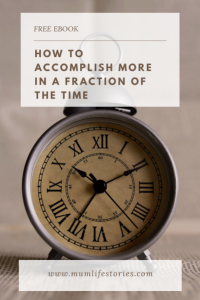They’re finally here, the results you’ve been waiting for, the winners of our very first Micro Fiction Writing Competition.
The theme was “Mother”, the word limit was 500 and the entries were awesome. The decision was a tough one but after much collaboration we picked our top 3.
I don’t want to keep you waiting any longer, so here are our 3 winners:
This Page contains affiliate links that may earn me a commission (at no extra cost to you) if you click through and make a purchase. Affiliate links are how I keep this blog running, thanks.
Photo by Joshua Golde on Unsplash
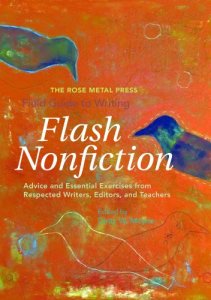 The Rose Metal Press Field Guide to Writing Flash Nonfiction
The Rose Metal Press Field Guide to Writing Flash Nonfiction
Winners
1st Place ($50 prize) – SEAN FALLON of Australia with “The Burning Library”
2nd Place ($20 Prize) – ALEXIS ARROWSMITH of Australia with “The Whole Mother”
3rd Place ($20 Prize) – ALIYAH ORR of the UK with “Blankets to Banners”
All of our top 10 short listed stories will be published in an anthology at the end of this year (2020) and all writers will receive a digital copy as part of their prize. The top 3 stories will be published on this blog in the stories section (over the next few days) and are included in this post also (scroll down to read). First place also receives a physical copy of the anthology once it’s been published.
We’d like to congratulate all our winners, and would like to thank once again all those who participated in the competition. We hope to see everyone back again for our next round and hopefully some new entrants as well. Click Here to check out the details of Round 2 and enter your story for your chance at a cash prize and publication.
Short List
In case you missed the announcement about the short list, I have included it here again (in alphabetical order).
- ‘At Sears Department Store’ – By Sarah Russell of the USA
- ‘Blankets To Banners’ – By Aliyah Orr of the UK
- ‘Conversations With Mum’ – By Connie Boland of Canada
- ‘I Demand To See The Manager’ – By Bett Willett of the USA
- ‘Midnight Reverie’ – By Maureen McVeigh of the USA
- ‘Preparations’ – By Nancy Leinweber of Australia
- ‘She Carries On’ – By Samantha Adair of Australia
- ‘Talismans’ – By Catherine Gillespie of the USA
- ‘The Burning Library’ – By Sean Fallon of Australia
- ‘The Whole Mother’ – By Alexis Arrowsmith of Australia
Stories
1st Place – Sean Fallon
What we liked: This is a very well written story about a relatable topic. The author draws us into the main character’s experience with the metaphor of the burning library, with a library as the setting of the story as well. Everything connects together in a pleasant flow, entertaining and touching at the same time.
Bio: Sean Fallon is from the UK and, after many years teaching abroad, now lives in Melbourne. He is currently working on his first novel, and he has been published in The Big Issue, Reader’s Digest, Film Inquiry, Writer Loves Movies, Yabangee, Audiences Everywhere, the Melbourne Writer’s Festival Blog, Defenstration Mag, and The Talk Film Society.
Authors Statement: The inspiration for this story was the death of my grandmother who passed away at the end of last year from Alzheimer’s, and how my mum had to watch her gradually disappear. My mum and nan have both been huge inspirations for me in my life and my writing, and I know my nan would be very happy to see me win this competition.
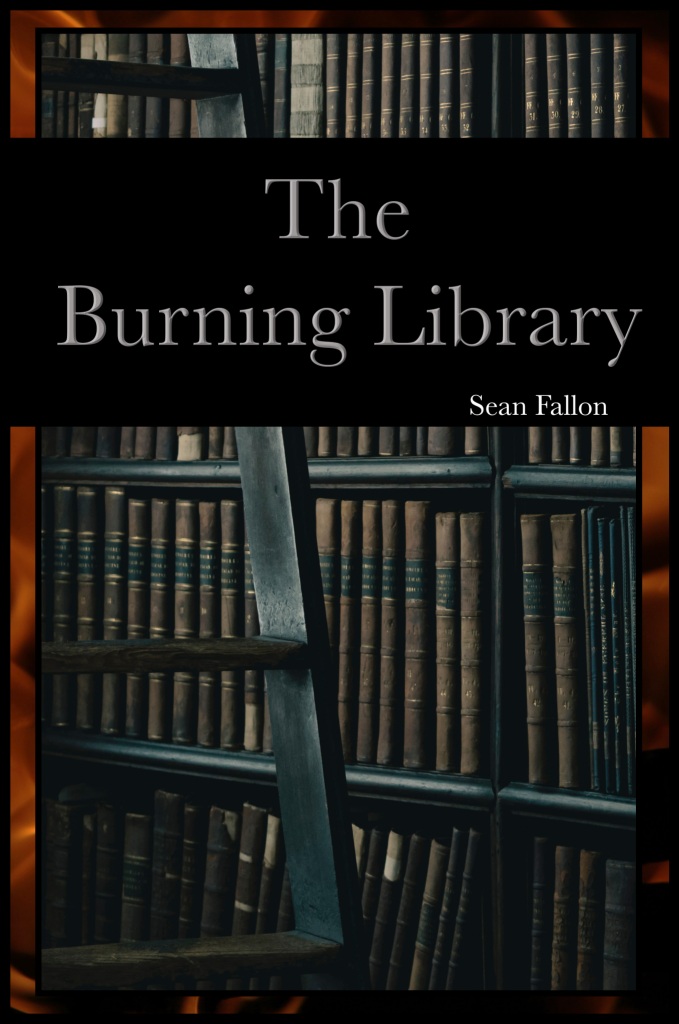 Photos by Henry Be and Francesco Ungaro on Unsplash
Photos by Henry Be and Francesco Ungaro on Unsplash
THE BURNING LIBRARY
When an old woman dies, it’s like a library has burnt down.
I think of that a lot as I watch the old woman lose her mind. It is ironic maybe that I’m watching her deterioration from behind the loans counter at the library she has visited every day for forty years.
It started slowly. Forgetting where certain shelves where. Mixing up westerns and fantasy so when she went looking for a book with a cowboy on the cover, she found a dragon instead.
Then she began forgetting to return books. For a few days, then a week, then twelve weeks. At first, I would politely remind her of her fines, and then, when I saw what was happening I started paying them off myself.
As it became clear what was happening, the old woman would fall into moods. Pungent with anger and fear, she would lash out at those seeking to help her. Her brain dull, but her words sharp as broken glass.
Eventually, a sort of calm fell over her. The doctors had her on antidepressants which removed the fear but also everything else, until the old woman was just shuffling into the library each morning to sit in her favourite chair and read a book she had already read. The letters that had once been so familiar, now becoming treacherous and cruel as they evaded understanding.
I watched her today. She sat in the chair, reading or at least looking at the book. There was so much in that head and every day we lost a little more. Memories of first loves, a recipe for Yorkshire pudding, funny stories, sad stories, any stories. The fire that consumed the library wasn’t picky. It didn’t hesitant or leave anything untouched. It burnt everything and left nothing for the survivors to find.
She closed her book and walked to the counter.
‘Has my reserve come in?’ She asked. She hadn’t put a reserve on for eight months.
‘Not today,’ I said after making a full show of looking it up on the computer.
She nodded, ‘Maybe tomorrow.’
‘Maybe,’ I said.
‘Okay. See you then,’ she leant forward to read my nametag. ‘Alex.’
‘Yeah, seeya then,’ She walked away. ‘Mum.’
2nd Place – Alexis Arrowsmith
We felt this story opened very well, with an intriguing scene and some real tension. A story that gives us enough to get a sense of the situation and create a mood but doesn’t explain too much, leaving us to use our imagination. An original story with an inspiring character.
Bio: Alexis Arrowsmith is a historian and writer based in Melbourne, Victoria. She has a particular interest in 20th century Russian and Eastern European social history and has spent time living, travelling, and studying in that region. Alexis has further professional experience as a policy adviser on history, heritage, and international legal matters, and as a teacher. She writes fiction and non-fiction on these topics. Her work has been published and presented in Australia and internationally.
Author Statement: My inspiration for The Whole Mother came from a combination of my research into the House on the Embankment in Moscow, and my grandmother who remained an activist for women and the working class her whole life while also raising children.
I write because I have always written and it helps me make sense of life, the world, and the people in it.
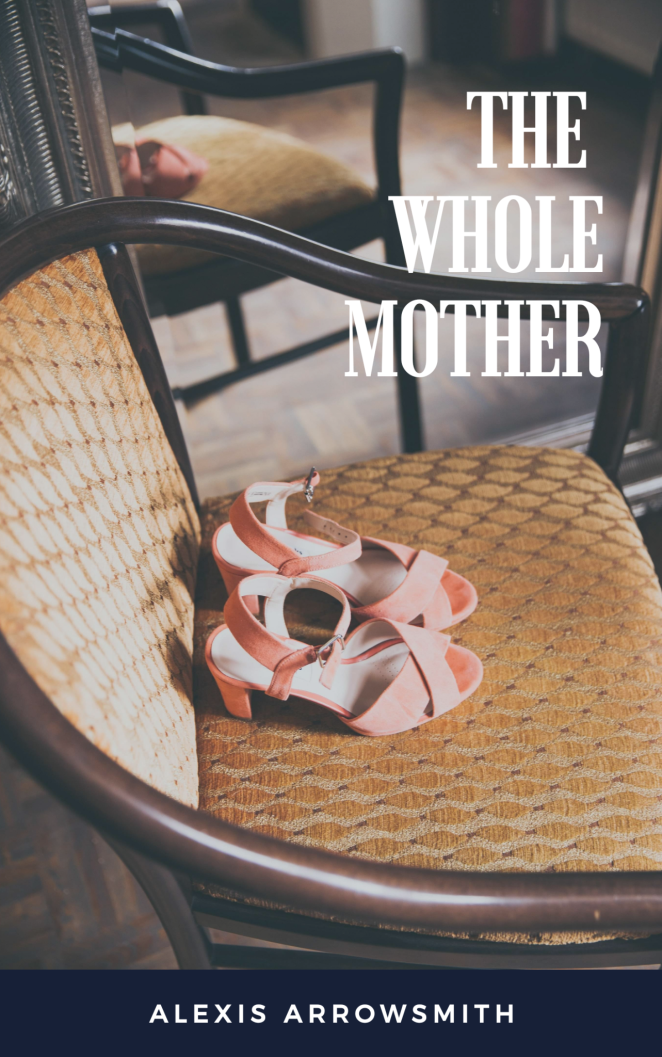 Photo by Stella de Smit on Unsplash
Photo by Stella de Smit on Unsplash
THE WHOLE MOTHER
My mother didn’t sleep for 6 days before she disappeared. She wore an enamel comb in her hair, her eyes were deep brown, and her left index finger was crooked at the top knuckle from a childhood accident. This is the collection of memories I have of her. My mother, who was a whole woman before she was a mother, and more complex than I have ever understood.
On the last day I saw her she dressed us in our uniforms, her crooked finger looping the red scarves around our necks. She sent us out to safety with smiles and kisses, an extra long hug we took as a sign of happiness about the holiday.
I have played her day in my mind all my life. I don’t remember my own. She would have looked out of her bedroom window at the white, almost solid, river below, feeling trapped by that ice in our house of privilege. She was unrepentant.
She would have seen soldiers and party members gathered on the square. As I heard her do on those sleepless nights, she would have walked out of her room, through the silent hall, living room, parlour. She could see men’s shadows under the front door. She knew they were men because they were always men. Sometimes they were dressed as tradesmen, sometimes in suits, sometimes servers in the cafeteria. But their faces were the same. She’d seen them by other doors. I’d seen them too, coming for other mothers, other fathers. I’d heard in whispers about the shadows under the doors. She faced the door and waited.
Her name was Larissa. She was gone when we returned.
I used to think she could have stopped it happening, if she’d just stopped herself. But instead, she had kept reading the newsletters, kept saying things she shouldn’t. She kept having other mothers over to our apartment, lively evenings with gritty tea, when the women spoke in code. She kept poking and provoking when she had us, me, to think about.
I used to think she was selfish. She was supposed to be my mother, and mothers put their children first. It took years to understand that love takes many forms and our mother loved us by being herself though it cost her herself and us.
Decades later I met with the children of other mothers who disappeared, but we hardly had anything to say. We live with the regrets of what we never asked these women, our mothers. We all admire them now, but we still fail to understand them. Can any child ever really understand their mother?
My mother was 36 when she disappeared, and she had lived a whole adult life, with us and without us. On that day I know she faced those men and made them see her as that whole woman, the before and the after.
It was only when I, too, saw her that way that I could begin to know my mother.
3rd Place – Aliyah Orr
We liked the poetic expression of this story whilst keeping with the narrative form. The end was particularly relatable because of its emotional realism and we felt there was a lot to learn from the message in the story that is a reflection on a life lived from birth to early adulthood.
Bio: Aliyah Kaitlyn Orr (pen name A.K Nephtali) is a British college student inundated with homework, coffee, and dreams in equal measure. They’ve been inspired by the power of words ever since a novel helped them realize their gender neutral identity, and they write inclusive fiction that aims to empower LGBTQ+ people world-round. (Rather, world-vaguely-pear-shaped, to be precise.) This is their first official award. They’re shocked enough to power a motor.
Authors Statement: ‘Blankets to Banners’ was inspired by an in-depth conversation with my mother on loving someone enough to let them go.
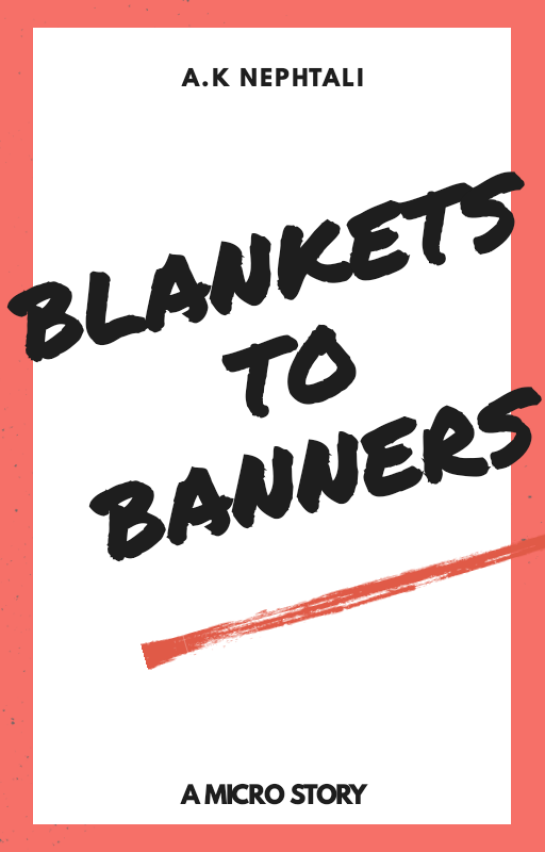
BLANKETS TO BANNERS
I loved you before you were born, when you were nothing more than a bump that occasionally wriggled. My little fish ninja, I called you, swimming and kicking about in the womb. A fighter you were. Premature, fragile as ice in the sun, but you refused to melt.
Soon the length of your torso became the length of your arms, and your babbling sounds turned into babbling. I hung onto every word, wished I had recorded them.
You commandeered our living room to live out your wildest fantasies, your enthusiasm so vivid I believed in them too. Almost. A scientist has limits, and while I was fine with your talking clouds and fairies, I couldn’t believe when you said you’d grow up.
But you did. Soon you began to teach me; explained why all plants under my inaptly named ‘care’ withered, told me facts from that podcast you adored. You dreamt of learning philosophy, pouring through dusty tomes brimming with wisdom, of the humanities, but those subjects don’t earn. I dissuaded you.
The light usually brimming in your blue eyes dimmed, but I stifled the guilt. It was for your own good. You repurposed the blanket forts into banners as you campaigned for human rights, as you became a better person than I was, than I am.
Then you spoke of becoming an aid worker in impoverished villages, eyes alight with passion or anger or both. Stay, I screamed. It’s not safe for you there. Stay. I tried to hide your passport, found you’d hidden it from me. You left, stretching the line of our connection taught until it snapped. The door swung open and let in frigid gales. I stood silent as snow drifted, washing you away with white.
You changed your number, my countless calls addressed to someone you had ceased to be. I had nothing left but images which I framed like Picasso’s art, but I wished I could do more. Your smile is more beautiful than any masterpiece. I keep the photos in a box under my bed, run my hands over the pixelated memories each morning in some nameless ritual. I’m afraid I’ll forget who you are. I breathe in sharply. Who you were.
Then you knock on my door. It’s summer. It’s been ten years. Who are you now? This new dignified woman in a blue blouse, whose accent is tinged with Spain and Russia, the story of your life untold. You bring your girlfriend with you: a warm-hearted vet with a doctorate in philosophy. You seem as much of a stranger to me as she does.
I smile and tell you to come inside for tea, start for an embrace, but the weight of time pulls down my arms. We shake hands. Cordially. It’s better than I deserve. I open my mouth to speak, and begin the process of learning who you are all over again.
Further Rounds
This series of competitions has now ended, you can read all the winning stories of subsequent rounds, below or visit our competitions page for more information on current competitions. An anthology with all 60 shortlisted stories is due for release in early 2021!
Don’t forget to sign up to our mailing list if you haven’t already, and receive notification of future writing comps and anthology releases, plus get all the latest news, stories and promotions including giveaways. You’ll also receive a FREE Ebook exclusive to our email subscribers. Click one of the links or enter your details below.
All the best and happy writing.
Get your FREE Ebook
The pace and intensity of our lives, both at work and at home, leave many of us feeling like a person riding a frantically galloping horse. Our day-to-day incessant busyness — too much to do and not enough time.
With this ebook you will learn to approach your days in another way, reducing stress and getting results through prioritizing, leveraging and focus!

